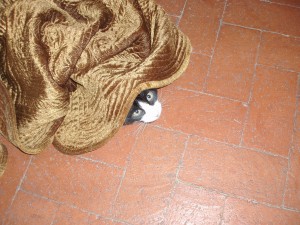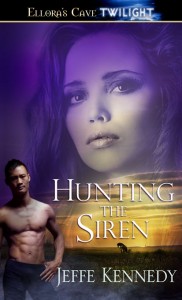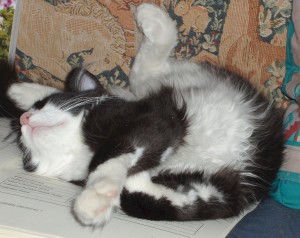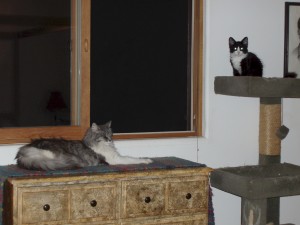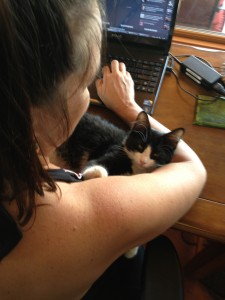 It makes it difficult to keyboard this way, but I cannot withstand the cuteness.
It makes it difficult to keyboard this way, but I cannot withstand the cuteness.
I took the day off yesterday – from both day job and writing. We went for a walk, had breakfast on the patio, watched the 4th of July parade and then hung out. I did a lot of reading under the grape arbor. There may have been wine-drinking involved.
I’m reading a Famous Series by a Famous Author. I’m coming in after the series is complete. Some time ago I picked up one of the books in hardback, because it looked intriguing and right up my reading alley. Also I had really enjoy this author’s historical/time-travel romances. I tried several times to get into it and never got past page 52. (I know this, because when I got it out this weekend, that’s where I’d left it marked.)
Recently, several readers mentioned that Rogue’s Pawn has similarities to this series. When I said I’d never read it, they insisted I just must. (And no, this is not Stacia Kane’s Downside Ghost series. A reviewer made that comparison and I’m just tremendously flattered. Stacy’s on her 5th book in that series and, if you haven’t read it, this review might convince you.)
At any rate, convinced that my mistake had been in not starting with Book 1 in the series, I figured out what the title was by going to the author’s website. I couldn’t tell by looking at Amazon, and read it on the Kindle. And okay – it was definitely better that way. I understood more of the story, was more invested in the characters and was willing to continue. I’m told that if I read the whole series, the payoff is big. That’s when I pulled out the hardback again and started over.
And I discovered why I’d gotten so bogged down before.
She starts the book off with recap of the story so far and lots of back story. Really boring “and this happened and that happened and then…”
The other day I posted about not slavishly following the rules, but boy howdy – that rule about not starting with back story and info-dump? Totally confirmed.
So then, I’m trudging through all this recap and she mentions stuff that I know didn’t happen in Book 1. But nowhere on this book does it tell me where it falls in the series. I went back to the author website and discover my hardback is actually Book 3. I buy Book 2 on my Kindle and start reading.
Guess what? It’s almost exactly the same damn boilerplate recap she started Book 3 with. Clearly she wrote it for Book 2, then just slapped it into Book 3, with a few additional details for things that happened in Book 2.
I just don’t get it. I mean, I know it’s not easy weaving in back story. My friend Allison Pang really bled over that when she wrote her Book 2. All I can think is that the author is Famous enough that her editor let her get away with this.
Thing is – it’s awful. And it absolutely stopped me from getting into her series when I blithely picked up Book 3 without knowing it.
Now I feel much better about how I’ve handled back story in RP2.
If I ever do this boilerplate thing? Somebody slap me!

